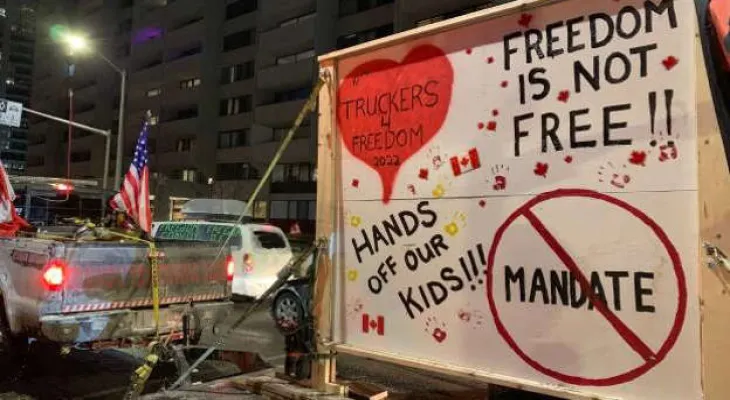Search here
Newspaper
Search here

Arab Canada News
News

Published: October 12, 2022
The public inquiry that will delve into the federal government's use of emergency powers during last winter's protests will hear early from Ottawa city figures, including outgoing Mayor Jim Watson and the candidate competing to become the next city mayor.
While Watson previously confirmed he would be a witness before the Public Order Emergency Commission, mayoral candidate Catherine McKenney was among many confirmed attendees on Tuesday.
McKenney said on Tuesday about their campaign in the municipal election to be held on October 24 while preparing to testify on Friday, "It’s a busy time." "It would have been easier if [the inquiry] happened after the campaign... but this is very necessary.
We need to know what happened, and why our city was under siege so that it doesn’t happen to us again." From late January to February 19, protesters gathered in downtown Ottawa against pandemic restrictions and government leadership by blocking access to neighborhoods and main arteries around the Parliament building and closing downtown streets with trucks and other vehicles.
Another blockade happened at the Ambassador Bridge connecting Windsor and Detroit and at the Coutts border crossing in southern Alberta. After much public outcry over the police’s failure to take decisive action to evict the Ottawa protest that turned into an occupation,
Prime Minister Justin Trudeau invoked the Emergencies Act on February 14, granting authorities broad temporary powers including the ability to freeze bank and credit card accounts. Protester McKenney will testify on Friday alongside MP Rideau-Vanier Matthew Fillion, who is not seeking re-election.
Both city council members harshly criticized the city's response during the protests. Watson is scheduled to testify in a few days, as is his political rival Diane Deans, the outgoing councillor in Gloucester Southgate. The mayors served for most of the convoy crisis as chair of the civilian board overseeing the local police service. She was ousted from her position by city council members about three weeks into the Ottawa occupation. Deans said she is eager to hear the mayor’s testimony, including why his office—through former Ontario Premier Doug Ford’s chief of staff, Dean French—negotiated with protesters on a plan to reroute trucks to Wellington Street when it was already blocked by protest vehicles.
She told the mayors that she, like former police chief Peter Sloly, would have opposed any vehicles moving into those areas and during that period warned the mayor’s chief of staff that she did not agree with Watson’s decision. She said, "They asked me to deal with it or find a way to be silent."
"I thought it was wrong at the time. I think it is wrong now." In response to a request for comment on the mayors’ remarks, Watson’s office said the mayor will not comment publicly until he testifies next week. He is scheduled to testify on Tuesday, depending on the length of the witnesses on the stand. Serge Arpin, the mayor’s chief of staff, is expected to precede Watson by one. Michael Kemba, associate professor of criminology at the University of Ottawa, said that studying this episode might shed further light on whether agencies failed to coordinate their responses during the convoy crisis. Kemba said, "It’s not [something] to blame, but definitely to learn from." Kemba said he also hopes the inquiry will hear more about the clear disagreement between Sloly and the federal government over whether the Ottawa Police had sufficient resources earlier in the occupation to suppress the protests much sooner.
Federal Public Safety Minister Bill Blair called on OPS to "do their jobs" on February 11, four days before Sloly’s resignation. Sloly said last week that he did not receive the "vast majority" of 2,000 additional officers they requested from other jurisdictions until after his resignation. Kemba said, "We need to clarify that."
Some 65 people are expected to testify during the inquiry from October 13 to November 25. Trudeau and government members are booked for the end of the inquiry, according to the witness list. Many convoy organizers are also expected to testify, as well as representatives from the Ottawa Police Service, Royal Canadian Mounted Police, various federal ministries, and the Privy Council Office.
Kemba said the commission is working on a "very compressed timeline" given the number of witnesses, and risks losing public interest as the inquiry continues. But Kemba said arranging the types of witnesses—starting with civilians and Ottawa city staff before moving on to higher levels of the office—is logical.
Kemba said, "The purpose of this inquiry is to look at the information [the federal government had] when it declared the emergency." "So by starting, in a way, on the ground and building through local police, local government, ultimately through convoy organizers, and then to the federal government, it kind of presents or builds that picture."
Editorial: Yusra Bamtraf
Comments